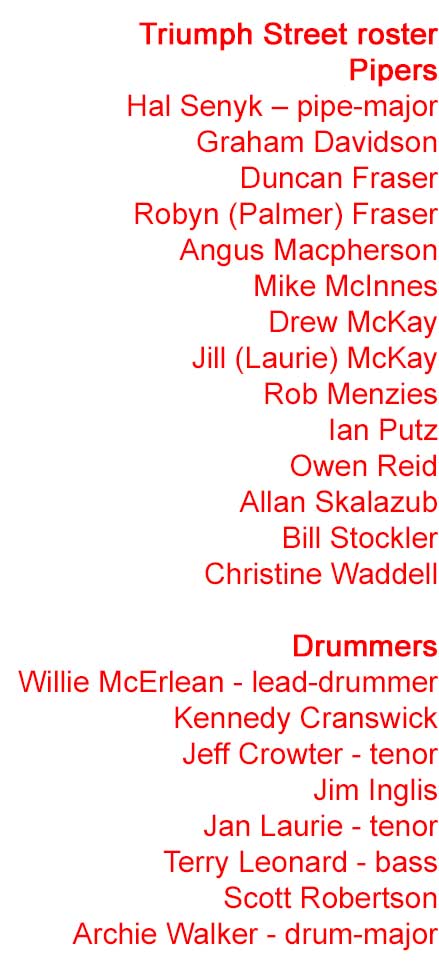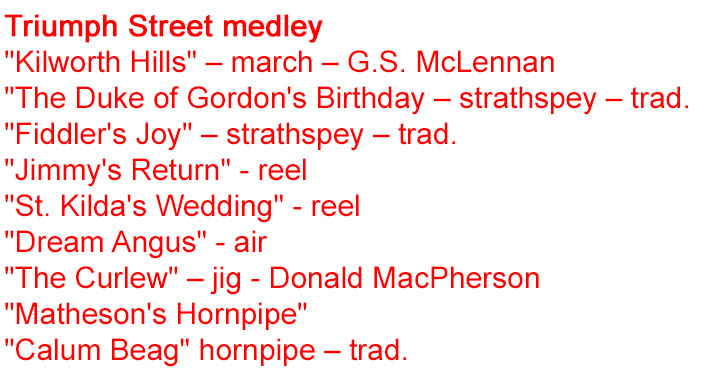Triumphant and Victorious – 1979 a historic World’s, 40 years later
![City of Victoria on the tuning park. Front rank L-R of P-M Jamie Troy, Bruce Gandy, Bill Mossie and P-S Steve Geddes. [Photo Allan Skalazub]](https://www.pipesdrums.com/storage/2019/07/Worlds1979_CityofVictoria_02.jpg)
But in 1979, the appetite for change still existed, and two bands from Canada seized on the remaining hunger. If the pipe band establishment would allow Dysart & Dundonald to win successive World Championships, perhaps it would also permit worthy non-UK bands to finally get a fair (or at least fairer) shake from the judges and the association.
 The Strathclyde Police had won the World’s in 1976 and it was time for them to resume power. After their two astonishing World’s victories, Dysart & Dundonald would never win again, and “The Polis” would go on to take a staggering 11 out of the next 13 World titles. With one great exception, the 1987 78th Fraser Highlanders, 1979 marked the start of a 12-year return to tradition: mainly familiar tunes and formats, with dogged adherence to conservative playing on precision-matched instruments.
The Strathclyde Police had won the World’s in 1976 and it was time for them to resume power. After their two astonishing World’s victories, Dysart & Dundonald would never win again, and “The Polis” would go on to take a staggering 11 out of the next 13 World titles. With one great exception, the 1987 78th Fraser Highlanders, 1979 marked the start of a 12-year return to tradition: mainly familiar tunes and formats, with dogged adherence to conservative playing on precision-matched instruments.
The Toronto area traditionally was seen as the hottest bed of pipe banding in Canada. The aforementioned Clan MacFarlane, City of Toronto/Caber Feidh and the emergent City of Guelph had pricked up ears, but thousands of miles west in British Columbia two bands were setting their own world standards.
City of Victoria and Triumph Street were carving a niche, carefully modelling their sounds and styles after the best that Scotland had to offer, not Dysart & Dundonald’s chanters-first style, but the Strathclyde Police, Shotts & Dykehead and Muirhead & Sons’ close attention to musical detail, heavy embellishments and rich drone sound.
Interestingly, the 1979 World Championships were the last to be held outside of Scotland. Nottingham, England, had won the rights to the event, which would return to Aberdeen once before settling into its apparently permanent home in Scotland’s largest city.
 Perhaps similar to hometown competitors often receiving a subconscious bump up from adjudicators, non-Scottish bands competing at a World’s not in Scotland might well have contributed to judges’ decisions. We can’t know for sure, but we can say with confidence that it didn’t hurt.
Perhaps similar to hometown competitors often receiving a subconscious bump up from adjudicators, non-Scottish bands competing at a World’s not in Scotland might well have contributed to judges’ decisions. We can’t know for sure, but we can say with confidence that it didn’t hurt.
Touchdown
The bands arrived in Scotland ready for action. Triumph Street had competed there in 1977, taking a fourth at the European Championships. City of Victoria were experiencing competition abroad for the first time.
“We flew from Vancouver on Thursday, August 9, to London and from there by bus to Nottingham,” says Triumph Street piper Allan Skalazub. “We arrived in Nottingham about 7 pm Friday night. Our accommodation . . . cost the princely sum of four pounds per night. Admission for spectators to the World’s was 80 pence. Our four buses in Scotland cost £380.”
![Triumph Street Pipe-Major Hal Senyk listening to the sound in the final tuning at the 1979 World Championships. [Photo Allan Skalazub]](https://www.pipesdrums.com/storage/2019/07/TriumphStreet_Worlds1979_01.jpg)
In an article from the Western Pipe Band Association’s journal, Strathclyde Police Pipe-Sergeant Angus J. MacLellan wrote: “In the practice field all the enthusiasts were going around listening to the various bands and asking the same questions. Would Dysart and Dundonald hold onto the title? Would the Shotts & Dykehead come back with a bang? Or was it the year for one of the two police bands? What about the challenge from overseas? In the first grade it was obvious that the two Canadian bands were a big threat. Everyone was impressed by them and when they played in the competition there were thoughts that the World Championship could leave Scotland for the first time.”
There were 17 bands entered in Grade 1 – two more than this year – and the English weather was hot and dry, probably putting all bands at the same disadvantage. The British Columbia groups were just as accustomed to wet and mild conditions as the Scots.
“The weather at the World’s that day was hot and dry – not the usual weather that we have come to expect over the years,” says Peter Aumonier, a piper with City of Victoria at the time who’s still competing now as a member of the Grade 1 78th Fraser Highlanders. “There was very little shade or trees in the park, but we found a spot where there was a gas-powered generator blasting away. As we were tuning up, I have a very vivid memory of [Shotts pipe-major] Tom McAllister, [Strathclyde Police pipe-major] Ian McLellan, [Lothian & Borders Police pipe-major] Iain McLeod and Bob Sheppard all walking by and stopping to listen to the band.”

This also was the year that Triumph Street brought home The Sash!
Quite an accomplishment and I believe the first time it crossed the pond.
What a fantastic article. Brings back brilliant personal memories. My first World’s. First time I got drunk. My own band had a terrible performance which in hindsight was not a surprise when the standard preparation was to drink all night, the night before the competition, and then to wonder why the judges placed you nearly last. It took a few years for the penny to drop, when we eventually had enough sense to actually perform well enough to win a world title. As for 1979, my first ever journey on a plane, stayed at Nottingham University, being starstruck by Strathclyde Police, something that continued up until recently, how exotic it was to hear this Canadian outfit called Triumph Street, recording and listening and then learning to play in our own band Kilworth Hills, and I’m sure many other bands did.. A simple but very effective tune. Also hearing their strange accents around the park. It was an innocent time! You are so right about Dysart, the Sex Pistols of the pipe band world. The urban rumours about these lads out of care homes and juvenile prisons who could play like demons. I remember listening to banjo breakdown over and over on the following years LP. You may not have liked them but they were the first band in my opinion that you could describe as innovative and have surely been influential to some who came after them. McLellan, the Bruce Springsteen of pipe bands, “The Boss” was just at the beginning of complete domination of the pipe band world culminating for me in the greatest MSR of them all, Hugh Kennedy, The ewe wi the crookit horn, Mrs McPherson of Inveran. Hairs standing to attention. Then back to Wollaton Park Nottingham. I’ve never returned to Nottingham by the way. A two day world’s? Whoever thought that would work? As far as I remember Boghall won Grade 2 that day and have remained in Grade 1 ever since. Some achievement. Loved all the info on the tunes the Canadian bands played and the programme cover. Some memories. I was 16 by the way. Far too young to get drunk for my first time! Thanks.
Great article and great memories of hearing City of Victoria and Truimph St- what a sound off their Hardie Chanters. Slight correction for Howard- Monktonhall won Grade 2 that year, although Boghall won all the other majors that year,
I don’t believe Worcester ever made the World’s prize list and Toronto in 1966 came 5th or 6th, not 3rd.
Cheers Les.